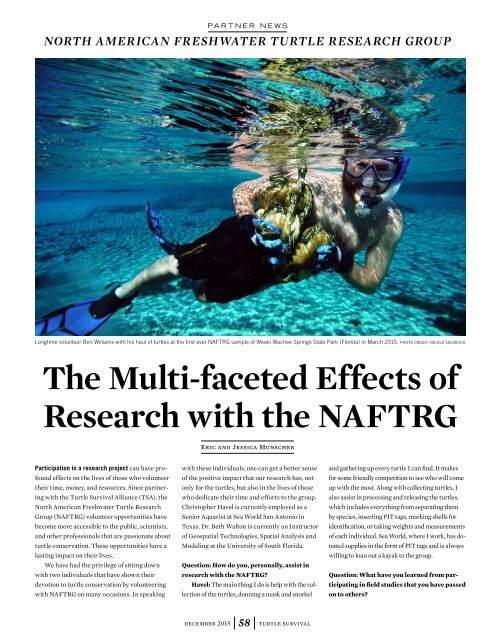Turtle Survival
2tUaeTbNi
2tUaeTbNi
You also want an ePaper? Increase the reach of your titles
YUMPU automatically turns print PDFs into web optimized ePapers that Google loves.
PARTNER NEWS<br />
NORTH AMERICAN FRESHWATER TURTLE RESEARCH GROUP<br />
Longtime volunteer Ben Williams with his haul of turtles at the first ever NAFTRG sample of Weeki Wachee Springs State Park (Florida) in March 2015. PHOTO CREDIT: NICOLE SALVATICO<br />
The Multi-faceted Effects of<br />
Research with the NAFTRG<br />
Eric and Jessica Munscher<br />
Participation in a research project can have profound<br />
effects on the lives of those who volunteer<br />
their time, money, and resources. Since partnering<br />
with the <strong>Turtle</strong> <strong>Survival</strong> Alliance (TSA), the<br />
North American Freshwater <strong>Turtle</strong> Research<br />
Group (NAFTRG) volunteer opportunities have<br />
become more accessible to the public, scientists,<br />
and other professionals that are passionate about<br />
turtle conservation. These opportunities have a<br />
lasting impact on their lives.<br />
We have had the privilege of sitting down<br />
with two individuals that have shown their<br />
devotion to turtle conservation by volunteering<br />
with NAFTRG on many occasions. In speaking<br />
with these individuals, one can get a better sense<br />
of the positive impact that our research has, not<br />
only for the turtles, but also in the lives of those<br />
who dedicate their time and efforts to the group.<br />
Christopher Havel is currently employed as a<br />
Senior Aquarist at Sea World San Antonio in<br />
Texas. Dr. Beth Walton is currently an Instructor<br />
of Geospatial Technologies, Spatial Analysis and<br />
Modeling at the University of South Florida.<br />
Question: How do you, personally, assist in<br />
research with the NAFTRG?<br />
Havel: The main thing I do is help with the collection<br />
of the turtles, donning a mask and snorkel<br />
and gathering up every turtle I can find. It makes<br />
for some friendly competition to see who will come<br />
up with the most. Along with collecting turtles, I<br />
also assist in processing and releasing the turtles,<br />
which includes everything from separating them<br />
by species, inserting PIT tags, marking shells for<br />
identification, or taking weights and measurements<br />
of each individual. Sea World, where I work, has donated<br />
supplies in the form of PIT tags and is always<br />
willing to loan out a kayak to the group.<br />
Question: What have you learned from participating<br />
in field studies that you have passed<br />
on to others?<br />
december 2015 58 turtle survival


